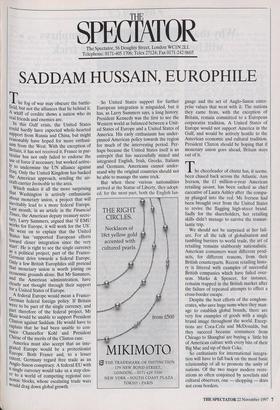The Spectator, 56 Doughty Street, London WC1N 2LL Telephone: 0171-405
1706; Telex 27124; Fax 0171-242 0603
SADDAM HUSSAIN, EUROPHILE
The fog of war may obscure the battle- field, but not the alliances that lie behind it. A whiff of cordite shows a nation who its real friends and enemies are.
In this Gulf crisis, the United States could hardly have expected whole-hearted suPPort from Russia and China, but might reasonably have hoped for more enthusi- asin from the West. With the exception of Britain, it has not received it. France in par- ticular has not only failed to endorse the use of force if necessary, but worked active- ly to undermine the UN alliance against Iraq. Only the United Kingdom has backed the American approach, sending the air- craft-carrier Invincible to the area.
Which makes it all the more surprising that Washington is actively enthusiastic about monetary union, a project that will Inevitably lead to a more federal Europe. Last month, in an article in the Financial Tunes, the American deputy treasury secre- tarY, Larry Summers, argued that 'if EMU works for Europe, it will work for the US'. , States went on to explain that the United sl tates has 'supported European efforts toward closer integration since the very start'. He is right to see the single currency as a political project, part of the Franco- German drive towards a federal Europe. Only a few British Europhiles still pretend that monetary union is worth joining on economic grounds alone. But Mr Summers, and the American administration, have Clearly not thought through their support for a United States of Europe. A federal Europe would mean a Franco- German federal foreign policy. If Britain Were to be part of the single currency, and Part therefore of the federal project, Mr Blair would be unable to support President Clinton against Saddam. He would have to explain that he had been unable to con- vince Chancellor Kohl and President Chirac of the merits of the Clinton case.
America must also accept that an inte- grated Europe would be a protectionist Europe. Both France and, to a lesser extent, Germany regard free trade as an Anglo-Saon conspiracy. A federal EU with a single currency would take us a step clos- er to a world of competing regional eco- nomic blocks, whose escalating trade wars Would drag down global growth. So United States support for further European integration is misguided, but it has, as Larry Summers says, a long history. President Kennedy was the first to see the Western world as balanced between a Unit- ed States of Europe and a United States of America. His early enthusiasm has under- pinned American policy towards the region for much of the intervening period. Per- haps because the United States itself is an entrepot that has successfully mixed and integrated English, Irish, Greeks, Italians and Germans, Americans cannot under- stand why the original countries should not be able to manage the same trick.
But when these various nationalities arrived at the Statue of Liberty, they adopt- ed, for the most part, both the English Ian- guage and the set of Anglo-Saxon enter- prise values that went with it. The nations they came from, with the exception of Britain, remain committed to a European corporatist tradition. A United States of Europe would not support America in the Gulf, and would be actively hostile to the American economic and cultural tradition. President Clinton should be hoping that if monetary union goes ahead, Britain stays out of it.
The cheerleader of chintz has, it seems, been chased back across the Atlantic. Ann Iverson, the £1 million-a-year American retailing savant, has been sacked as chief executive of Laura Ashley after the compa- ny plunged into the red. Ms Iverson had been brought over from the United States to revive the flagging high-street brand. Sadly for the shareholders, her retailing skills didn't manage to survive the transat- lantic trip.
We should not be surprised at her fail- ure. For all the talk of globalisation and tumbling barriers to world trade, the art of retailing remains stubbornly nationalistic. American consumers want different prod- ucts, for different reasons, from their British counterparts. Recent retailing histo- ry is littered with examples of successful British companies which have failed over- seas. Marks & Spencer, for instance, remains trapped in the British market after the failure of repeated attempts to effect a cross-border escape.
Despite the best efforts of the conglom- erates, who save huge sums when they man- age to establish global brands, there are very few examples of goods with a single brand image throughout the world. Excep- tions are Coca-Cola and McDonalds, but they succeed because consumers from Chicago to Shanghai are buying a little bit of American culture with every bite of their Big Mac and sip of their Coke.
So enthusiasts for international integra- tion will have to fall back on the most basic relationship of all to promote the unity of nations. Of the two major modern recre- ations so often conjoined by novelists and cultural observers, one — shopping — does not cross borders.


















































































 Previous page
Previous page